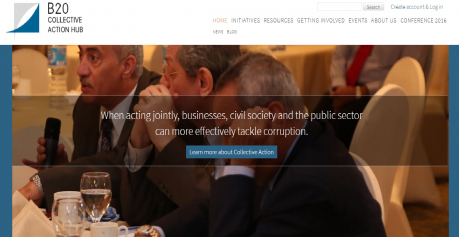UNIC launches cooperation with the International Centre of Collective Action (ICCA) at the Basel Institute on Governance

In January 2018, the Ukrainian Network of Integrity and Compliance became a member of the B20 Collective Action Hub at the International Centre for Collective Action (ICCA). ICCA works with companies and other relevant stakeholders to develop, facilitate and moderate anti-corruption Collective Action initiatives in a variety of industry sectors.
The ICCA was launched in 2012 by the Basel Institute on Governance, an independent not-for-profit competence centre specialising in corruption prevention and public governance, corporate governance and compliance, anti-money laundering, criminal law enforcement and the recovery of stolen assets.
ICCA has been a supporter throughout the conceptualization and establishment of UNIC and this work has been cited by Gemma Aiolfi, Head of the ICCA, as being a step in the right direction for business in Ukraine. On accepting UNIC into the B20 Collective Action Hub she said that “seeing UNIC’s approach in promoting and encouraging business driven integrity in Ukraine is a positive development which the ICCA is committed to supporting in future, and we therefore welcome UNIC to the network that the B20 Collective Action Hub offers.”
ICCA puts its practical and academic expertise and experience at the disposal of entities interested in engaging in anti-corruption Collective Action initiatives, by acting as a facilitator and advisor to business, government and civil society on how to set up, structure and manage Collective Action initiatives most effectively. This can include a direct involvement in the facilitation of national or sectoral Collective Action initiatives, as well as advising and supporting their development. In addition, the ICCA through its network of institutional partners and members facilitates peer learning opportunities and dialogue between Collective Action Initiatives.
What this means for the UNIC:
- Practical and academic expertise and experience of ICCA at the disposal of the UNIC.
- Opportunity to address the ICCA as an advisor on structuring and managing the initiative most effectively. This can include a direct involvement in the facilitation of national or sectoral initiatives, as well as tailored advice.
- Facilitated dialogue and peer learning between the institutional partners of the ICCA and the UNIC.
Ganna Gerasymchuk, the Head of the UNIC’s Secretariat, mentioned: “Inclusion in the global database of Collective Actions means that it is now connected with more than 100 initiatives from all over the world. It provides the UNIC access to dedicated service and advice, through access to a knowledgeable team in Basel, and potential like-minded partners from around the globe.”




